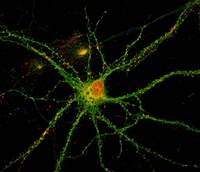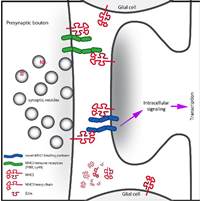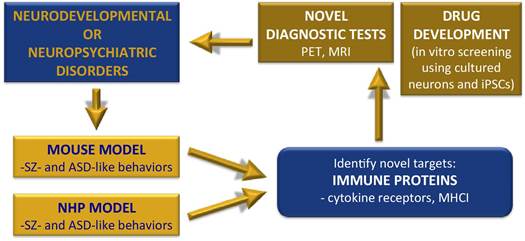A. Kimberley McAllister, Ph.D.
Brief Biography

Dr. McAllister earned her Ph.D. in neurobiology from Duke University in the laboratory of Lawrence C. Katz in 1996 after becoming inspired to pursue a research career as an undergraduate at Davidson College in North Carolina. She has pursued neuroscience research for 30 years and has expertise in developmental neurobiology, cell and molecular biology, biochemistry, electrophysiology, electron microscopy, and advanced imaging techniques.
During her graduate studies at Duke, Dr. McAllister investigated the effects of experience and neural activity on brain development. After obtaining her Ph.D. in 1996, Dr. McAllister changed fields to learn biophysics and computer programming from a leader in that field, Dr. Charles Stevens.
Dr. McAllister joined the faculty at the Center for Neuroscience and Department of Neurology in January 2000. In the past 24 years, her laboratory has made seminal discoveries about how proteins are transported in brain cells before and during the formation of connections and has discovered novel roles for immune molecules in brain development and plasticity.
Research Overview
Research in the McAllister laboratory focuses on understanding the cellular and molecular mechanisms of synapse formation and refinement during development and in disease. They use an arsenal of approaches, including development of new techniques, to address these questions both in vivo and in vitro. The McAllister laboratory has pioneered time-lapse imaging approaches to study protein transport before and during synapse formation and, most recently, synapse dynamics using a novel long-term imaging assay.
The McAllister laboratory is also one of only a few labs that study how “immune” molecules, such as MHCI and cytokines, regulate the initial establishment of cortical connections. They have found that MHCI molecules and interleukin-1 receptors are present at developing synapses, where they negatively regulate synapses. Ongoing efforts aim to identify the molecular mechanisms that underlie these effects and identify the signaling molecules that act upstream of these synaptic immune molecules to cause synapse loss in development and in disease models. Finally, Dr. McAllister and team recently launched a new research direction into Alzheimer’s disease research focusing on the role for MHCI molecules in neurodegeneration. They have found that MHCI mediates Ab-induced synapse loss and cognitive deficits both in vivo and in vitro.
Multi-Disciplinary Collaboration
Since these immune molecules are implicated in several neurodevelopmental disorders, including autism and schizophrenia, MHCI molecules could mediate the effects of the environment on cortical connectivity both during normal development and in disease. Indeed, they have found that MHCI and cytokines mediate the effects of maternal infection in causing behavioral alterations in offspring. In parallel to the McAllister laboratory’s basic research in neuroimmunology, they also work in translational neuroscience through leading a multi-disciplinary collaboration between eight groups at UC Davis, funded initially by a UC Davis RISE Pilot Center grant and transformed into an NIMH Conte Center, which was recently renewed. Through this center, they have identified proteins in female mice before pregnancy and following maternal immune activation that predict susceptibility and resilience to schizophrenia- and autism-related behavioral and neurochemical alterations in offspring. They are currently using this information to test biomarkers and new treatments to identify susceptible pregnancies and prevent the effects of maternal infection on brain development and behavior in offspring.
Research Program Details
Brain Connections:
 Because we are constantly able to learn new things, our brains are also always changing through the formation, stabilization, and elimination of connections. Dr. McAllister uses advanced time-lapse imaging to study the way that learning and brain changes, or plasticity, govern the properties of neural connections. Her research aids the growing field of nootropics and may help to enhance function in both healthy and diseased brains.
Because we are constantly able to learn new things, our brains are also always changing through the formation, stabilization, and elimination of connections. Dr. McAllister uses advanced time-lapse imaging to study the way that learning and brain changes, or plasticity, govern the properties of neural connections. Her research aids the growing field of nootropics and may help to enhance function in both healthy and diseased brains.
Immune Molecules:
 Dr. McAllister’s lab is one of the few in the world that study the role of immune molecules on neurons in brain development. Her laboratory has found that MHCI molecules limit the connections that are formed in the developing brain and her team is actively studying the mechanisms underlying this effect. By further understanding the way in which the immune and nervous systems are connected, her research may prevent and/or treat neurodevelopmental disorders resulting from either genetic mutations in immune molecules or immune dysregulation.
Dr. McAllister’s lab is one of the few in the world that study the role of immune molecules on neurons in brain development. Her laboratory has found that MHCI molecules limit the connections that are formed in the developing brain and her team is actively studying the mechanisms underlying this effect. By further understanding the way in which the immune and nervous systems are connected, her research may prevent and/or treat neurodevelopmental disorders resulting from either genetic mutations in immune molecules or immune dysregulation.
Immune Signaling:
Dr. McAllister and her team have identified a set of immune molecules in the brain, shared across species, that may contribute to aberrant behaviors and changes in brain form and function linked to schizophrenia, autism spectrum disorders, depression, epilepsy, and possibly Alzheimer’s disease. If successful, Dr. McAllister’s research could help lead the process of developing novel diagnostic tools and therapies to detect psychiatric disorders much earlier than is currently possible and to treat them more effectively.

Future Directions
Dr. McAllister’s laboratory is striving to identify new molecular targets for development of novel diagnostic tools and drug discovery to identify and treat neurodevelopmental and neuropsychiatric disorders earlier and more effectively.

